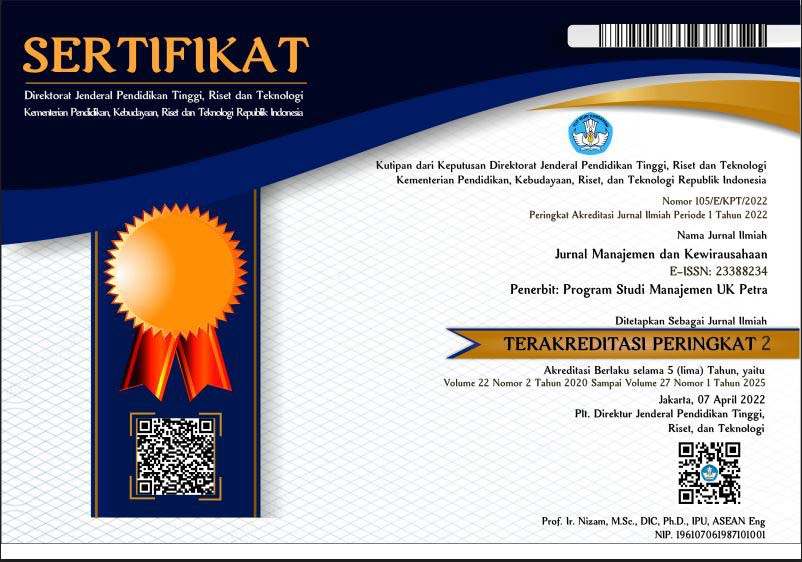ANALISA PERGERAKAN SUKU BUNGA DAN LAJU EKSPEKTASI INFLASI UNTUK MENENTUKAN KEBIJAKAN MONETER DI INDONESIA
 :
:
https://doi.org/10.9744/jmk.4.2.pp.%2098-107
Keywords:
Key words, inflation, interest rates, expectations, cointegration, regression.Abstract
Inflation has become a problem in the Indonesian economy. There are several ways the government has attempted to overcome the economic crisis. The government has often used tight money policies by raising interest rates in Indonesia. For that reason, interest rates are important, because they can be used to evaluate expectations of inflation. This analysis uses regression and cointegration to test the short-run and the long-run relationships between inflation spreads and interest rate spreads. Based on the results, the spreads which can explain inflation expectations in the short-run are the 12-1 month interest-rate spread; the 12-3 month interest rate spread; the 12-6 month interest rate spread; the 6-1 month interest rate spread; and the 6-3 month interest rate spread. In the long-run, only one interest rate spread is found to significantly explain the expected inflation path, the 12-3 month interest rate spread. Because of that, it is suggested that the government or economic participants in Indonesia use the 12-3 month interest rate spread to analyze expected inflation in Indonesia, since this spread can be used in both the short and long-run. Abstract in Bahasa Indonesia : Inflasi telah menjadi masalah besar dalam perekonomian Indonesia. Ada berbagai cara dilakukan oleh pemerintah untuk mengatasi krisis yang terjadi. Pemerintah Indonesia sering menggunakan kebijakan uang ketat dengan menaikkan suku bunga. Karena itu, tingkat suku bunga menjadi penting, karena bisa digunakan untuk menganalisa ekspektasi inflasi. Analisa ini menggunakan regresi dan kointegrasi untuk menguji hubungan jangka pendek maupun jangka panjang antara spread inflasi dengan spread suku bunga. Dari hasil yang diperoleh untuk jangka pendek, spread yang mampu menjelaskan ekspektasi inflasi adalah spread suku bunga deposito 12-1 bulan; spread deposito 12-3 bulan; spread deposito 12-6 bulan; spread deposito 6-1 bulan; dan spread deposito 6-3 bulan. Sedangkan untuk jangka panjang hanya ada satu spread deposito yang dapat menjelaskan pergerakan ekspektasi inflasi, yaitu spread deposito 12-3 bulan. Karena itu, disarankan agar pemerintah maupun para pelaku ekonomi di Indonesia menggunakan spread suku bunga deposito 12-3 bulan untuk menganalisa ekspektasi inflasi di Indonesia, karena spread tersebut dapat digunakan dalam jangka pendek maupun dalam jangka panjang. Kata kunci: inflasi, suku bunga, ekspektasi, kointegrasi, regresi.Downloads
Published
2004-06-04
How to Cite
Erawati, N., & Llewelyn, R. (2004). ANALISA PERGERAKAN SUKU BUNGA DAN LAJU EKSPEKTASI INFLASI UNTUK MENENTUKAN KEBIJAKAN MONETER DI INDONESIA. Jurnal Manajemen Dan Kewirausahaan, 4(2), pp. 98-107. https://doi.org/10.9744/jmk.4.2.pp. 98-107
Issue
Section
Articles
License
Authors who publish on this journal agree to the following terms:
- Authors retain copyright and grant the journal right of first publication with the work simultaneously licensed under a Creative Commons Attribution License that allows others to share the work with an acknowledgement of the work's authorship and initial publication in this journal.
- Authors are able to enter into separate, additional contractual arrangements for the non-exclusive distribution of the journal's published version of the work (e.g., post it to an institutional repository or publish it in a book), with an acknowledgement of its initial publication in this journal.
- Authors are permitted and encouraged to post their work online (e.g., in institutional repositories or on their website) prior to and during the submission process, as it can lead to productive exchanges, as well as earlier and greater citation of published work (See The Effect of Open Access).

















